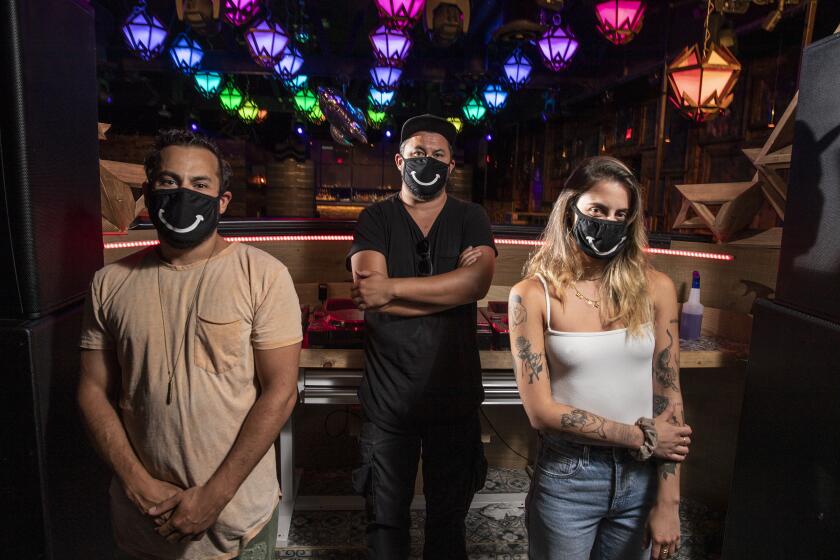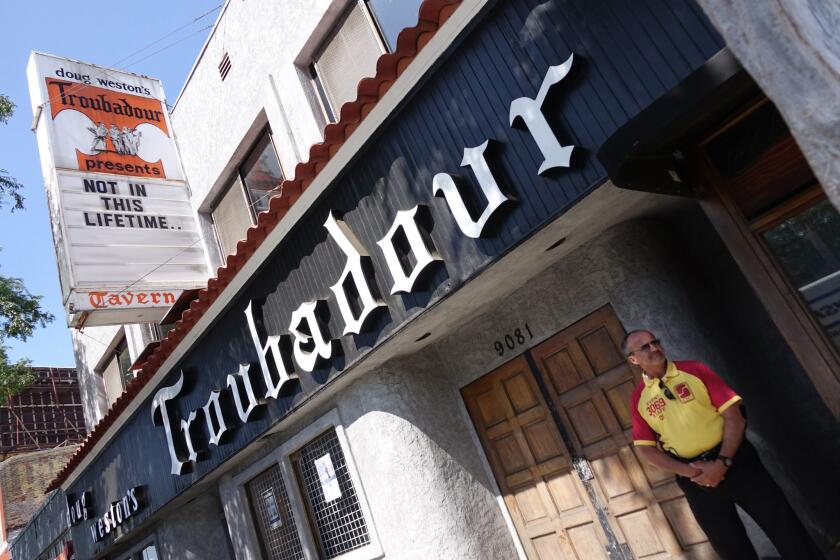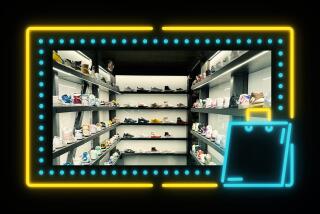After five decades, McCabe’s Guitar Shop owners are retiring, citing coronavirus crisis
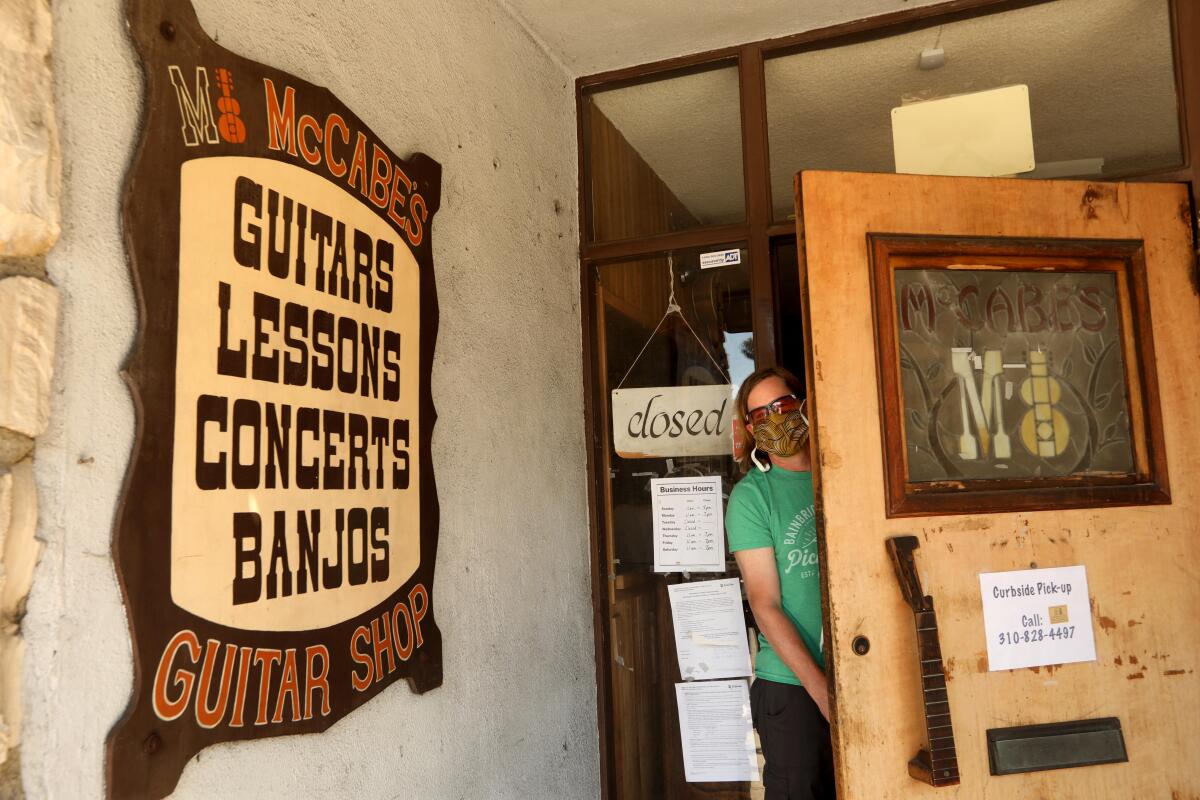
After a night last week in which protesters and police clashed in Santa Monica, Esperanza Riskin clocked in early at McCabe’s Guitar Shop, the store she co-owns with husband Bob in the city’s West Pico District. She wanted to get a jump on the day. Espie, as she is known, was braced for the possibility that the famed instrument store and backroom performance space might at some point be vandalized.
She was also preparing to open for the day by organizing curbside pickup orders. Due to the COVID-19 pandemic, the store had been shuttered, which meant that until last week the countless working musicians who have treated the shop as a second home since its birth in 1958 couldn’t access the objects of their desire, or get their own musical tools fixed, for a few months.
When, in March, the shop’s first attempt at getting relief through the Paycheck Protection Program for small businesses was denied, the Riskins feared they’d have to close the landmark shop for good. Luckily, they were approved in the second round.
Espie and Bob have co-owned McCabe’s for more than 50 years, playing a crucial role as it became one of the most famous guitar stores in the country. Its intimate stage has featured hundreds of artists including R.E.M., Townes Van Zandt, Tom Waits, Emmylou Harris, John Fahey, Gabor Szabo, Gil Scott-Heron, Kate & Anna McGarrigle and Tom Petty.
The Riskins are in their 70s and figured on retiring in a few years, but 2020 has taken its toll, Espie said on Monday. So, after a life spent supporting and offering refuge for countless musicians, they’re leaving the business.
“It’s sooner than we wanted to,” she said, adding that “it’s kind of been heart-wrenching, actually. We’re really sad.”
An oral history of the coronavirus pandemic, as told by the staffs of four iconic L.A. nightclubs: the Troubadour, McCabe’s Guitar Shop, Sound and the Satellite
The threat of catching the virus has prompted them to speed the transition of the store’s operations to their daughter and son-in-law, Nora and Walt McGraw. “I can’t endanger my husband by coming in here and getting it, or endanger myself,” Espie said.
Opened down the street from its current location as part of a furniture store by proprietors Gerald McCabe and Walter Camp, the store boomed with the folk and blues revival of the 1960s, and helped supply expert country-rock players in the 1970s. While in his teens in the early ’60s, Bob started sweeping the floors as he was learning to become a luthier, someone who builds and repairs stringed instruments. He became a partner in the business not long after. (Bob is the son of actress Fay Wray and screenwriter Robert Riskin [“It Happened One Night”].)
As if by reflex, Espie recalled the first McCabe’s live performance in the late 1960s. It was by country blues guitarist Elizabeth Cotten and her accompanist, Mike Seeger, and arranged after the artist’s higher-profile paying gig was canceled. Lacking money to buy a bus ticket back to her East Coast home, Cotten asked to do a set at the shop.
“We didn’t have a license to run a concert at that point,” Espie explained. “We said, ‘You know what? We’ll put a curtain over the front window, put seats up and see what we can get so you can get home.’ And then Ramblin’ Jack Elliott needed money. So we said, ‘Look, we better get a license so we don’t get into trouble.’”
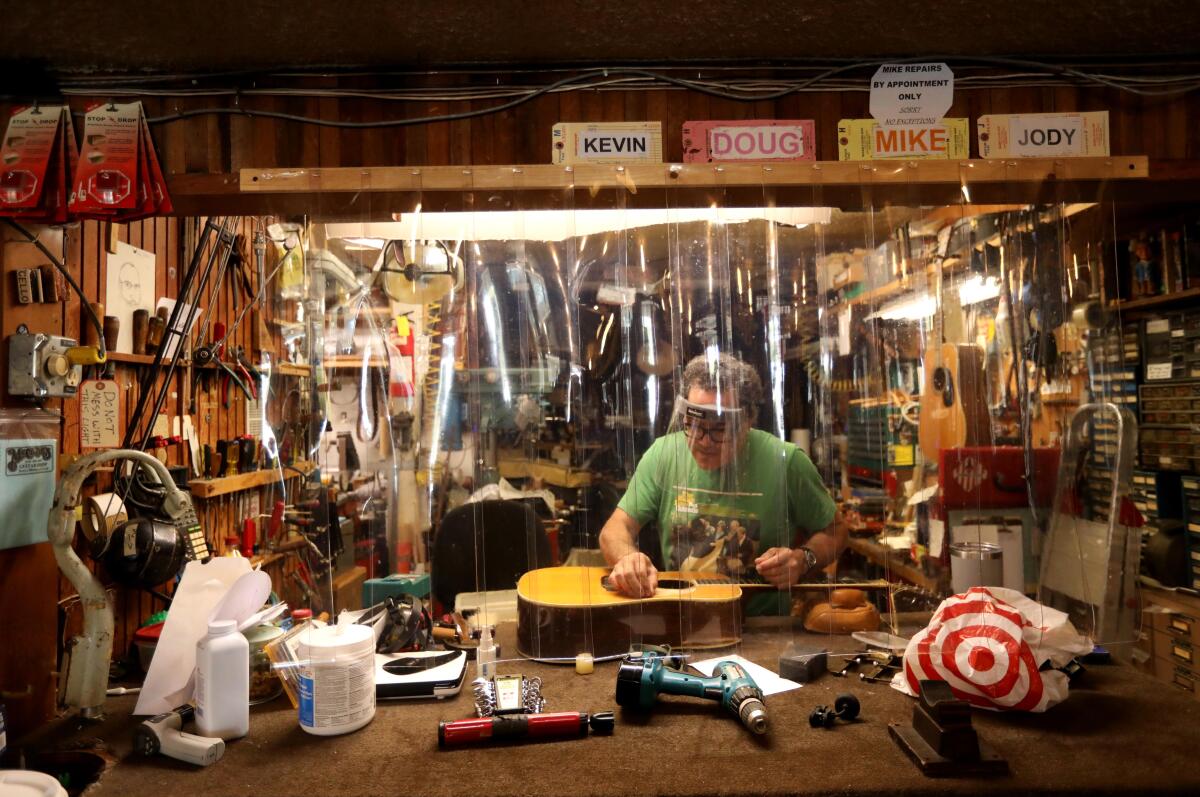
The store gradually became as noted for its nighttime hushed-audience gigs as its daytime expertise with guitars, banjos, mandolins and other stringed instruments. Its teachers have schooled thousands of Angelenos on the magic of musical performance. On most weekend nights before the virus, its small theater, which holds 150 people, was packed.
Not that you could tell from outside. The booze-free space has always drawn the quietest, most respectful listeners in Los Angeles.
“If you want to chew gum or pop your hairband, you better go out into the front, because they don’t want you in the concert venue,” singer-songwriter Carla Olson said. “And when you are on the stage, it’s equally as intimate, because anything you say or do, the audience is going to pick it up. That kind of venue doesn’t exist anymore.”
Artists haven’t always followed the venue’s lead. Loudon Wainwright III recalled to The Times in 2008 a set by influential singer-songwriters Townes Van Zandt and Guy Clark. “It was really something to behold in that room where the main libation is herbal tea with a shot of honey in it,” Wainwright said. “Townes and Guy were just plastered. It was kind of a beautiful thing to behold. The audience, too, it was like a contact drunk, like everybody in the room got drunk with them. That room is a conduit in so many different ways.”
Olson and her longtime collaborator, the late Byrds co-founder Gene Clark, played McCabe’s half a dozen times over the years, and she attended other artists’ sets with him. Most memorably, long after the demise of the Byrds, she and Clark went to see his former bandmate Roger McGuinn play McCabe’s.
“They hadn’t spoken to each other in a number of years,” Olson recalled. “We went upstairs before the show — Gene wanted to say hi to Roger. Gene wanted to play so bad, and Roger’s not the person to ask.” Fearing a moment lost, Olson’s husband, Saul Davis, jumped in to propose that Clark join McGuinn. The two former Byrds ended up doing an encore of “Mr. Tambourine Man,” “Chimes of Freedom” and “The Bells of Rhymney.”
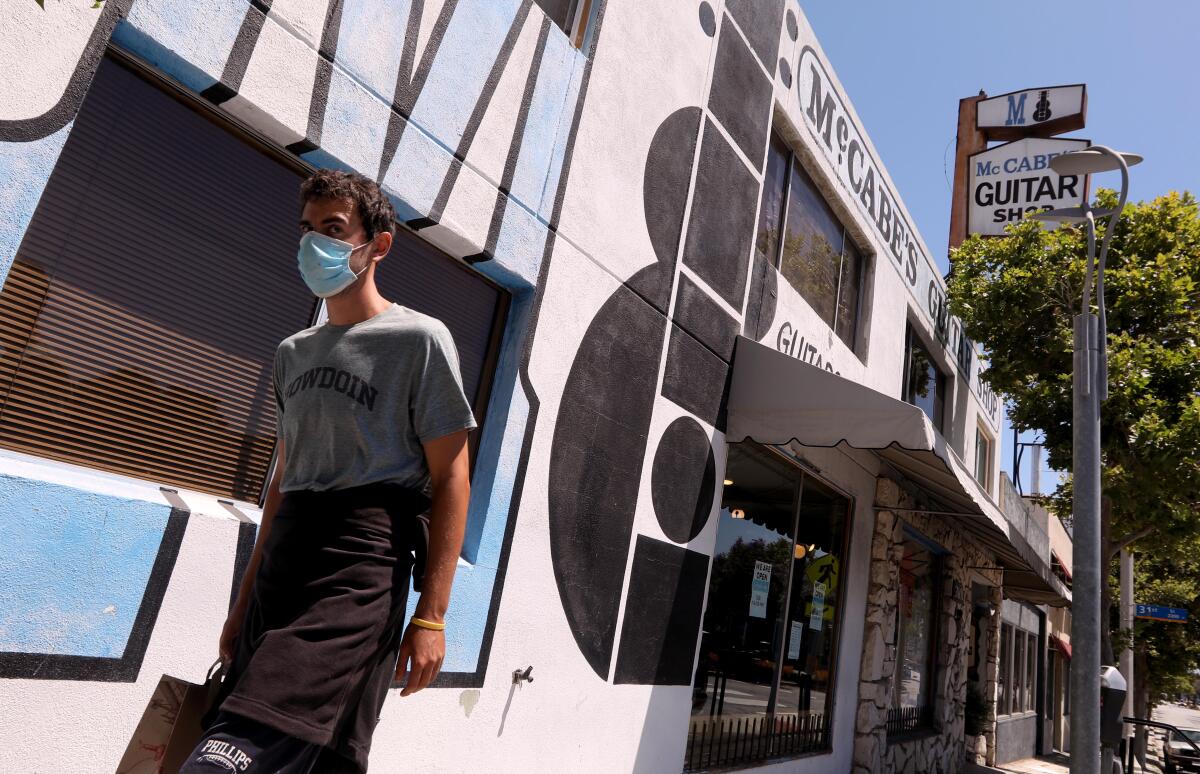
Olson most recently played there during a release party on Feb. 21 for her new album, “Have Harmony, Will Travel 2.”
“Putting on concerts is more fun than buying advertising,” Bob Riskin told The Times in 1990. His logic was that the concerts would spur musicians to check out the music store, repair shop and school as they made their way to the back room. “It keeps the name out there, and also gives you a place where you can buy a guitar, get it repaired, get lessons on it and come see someone perform who is very skilled on it.”
That communal vibe has extended to the pandemic hiatus, Espie said. Though she was gutted by having to stay away, she said the response during the forced closure was “heartwarming, too. I just had a customer call from back East to ask if we were OK. The community keeps calling, saying, ‘You’re still open, right? You’re going to reopen, right?’”
She has tried to reassure them, but added on Monday that the store, like all other indie retailers, is in unknown territory. “The sales right now are not keeping us going, even on the curbside,” Espie said. “What’s keeping us going and being able to pay our employees is that loan.”
She adds, “We’re going to run out of it soon if we don’t get our sales up. And if we don’t get our sales up, we won’t be able to open the concerts.”
The general manager of the Troubadour, which famously launched Elton John’s career, says ‘to survive, we’re going to need all the help we can get.’
Turning optimistic, she contemplated McCabe’s after their retirement and after the end of the pandemic. Maybe, she said, “it’s the perfect time, because it’s like a new store. With this COVID thing, it’s like we’re starting from ground zero again, with the concerts and with everything.”
Kora Peterson, who books the shop’s performances in her role as concert director, envisions McCabe’s emerging from the COVID-19-forced hibernation with a renewed, and updated, mission to showcase artists. They’re working with a sound engineer to mike the room for online gigs. “I have no idea how that works yet, but we’ll make it happen.”
She adds, “McCabe’s concerts started because an artist needed help, and I think it’s important now to still be there for artists, and for our customers. If we have to reach them remotely, at least we’re still reaching out.”
“It’s a place we want to keep going,” said Walt McGraw, 52, the Riskins’ son-in-law. He and Nora live on Bainbridge Island off Seattle, and Walt drove down last weekend to help ready the shop for curbside delivery and eventual reopening. “We’re putting up our Plexiglass, making sure our employees are safe and figuring out what our procedures are going to be.”
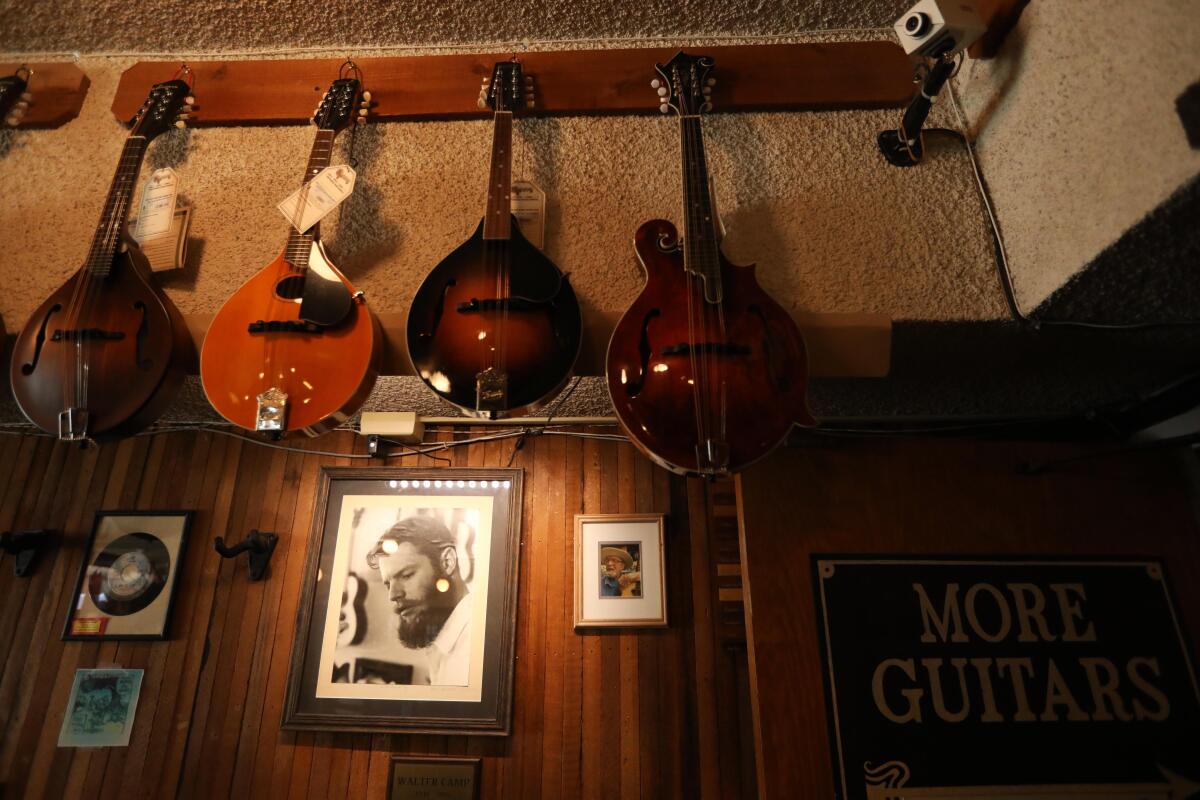
McGraw got a firsthand sense of the store’s import a few years ago when he was with his in-laws during an event also attended by Jackson Browne. After the Riskins mentioned their plans to eventually cede control of the shop, McGraw recalled Browne reminding him about how essential the shop was: “He put his hand on my shoulder and said, ‘You do realize how important this is, don’t you?’”
Added McGraw: “I’ve been tasked with a quest. If it wasn’t just coming from the in-laws, then Jackson Browne is personally making sure that we keep this place going.”
More to Read
The biggest entertainment stories
Get our big stories about Hollywood, film, television, music, arts, culture and more right in your inbox as soon as they publish.
You may occasionally receive promotional content from the Los Angeles Times.
